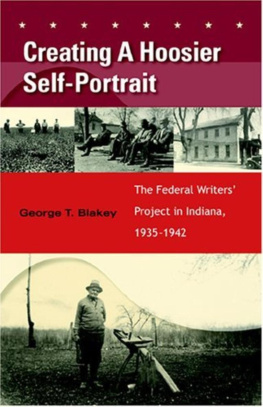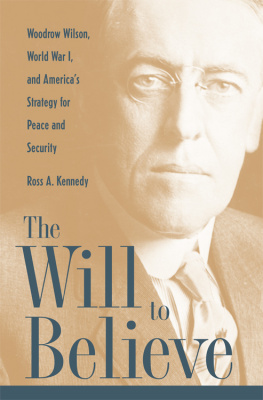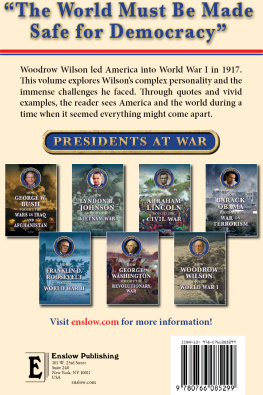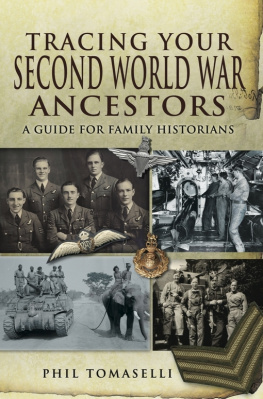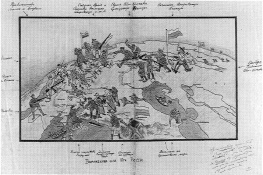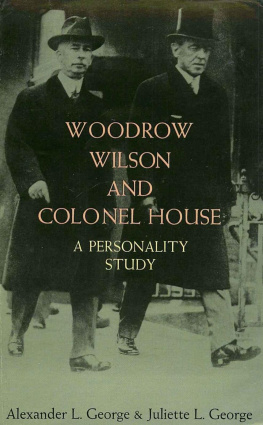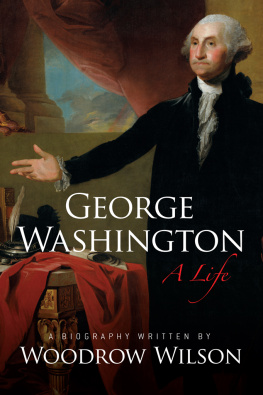ISBN 978-0-8131-5129-8
Library of Congress Catalog Card Number: 79-132825
Copyright 1970 by The University Press of Kentucky
A statewide cooperative scholarly publishing agency
serving Berea College, Centre College of Kentucky,
Eastern Kentucky University, Kentucky State College,
Morehead State University, Murray State University,
University of Kentucky, University of Louisville,
and Western Kentucky University.
Editorial and Sales Offices: Lexington, Kentucky 40506
To the guidance of John E. Wiltz
and the friendship of the Eastern Indiana Center,
I owe my deepest thanksI. The Dilemma of War
As America entered war in April 1917, two historians issued appeals for support and service during the national crisis: President Woodrow Wilson and his former professor, J. Franklin Jameson. Wilson asked for mobilization of Americas physical resources to wage a moral crusade against the forces of teutonic militarism in Europe. Jameson sought to muster the intellectual resources of historians in defense of Americas position. The appeals of these two men presented in microcosm the dilemma facing Americas young historical profession, that of how far a historian could go in patriotic support of his nations war aims and still remain faithful to the canons of scholarship. In a period of national crisis would it be possible to serve both profession and country, one demanding scholarly detachment, the other emotional commitment?
Wilsons appeal came less from a historian than from the leader of world democracy; he aimed it at the public rather than the academic community and sought an emotional rather than an intellectual response. Although he had earned his doctorate in history at Johns Hopkins University, had written several volumes of historical narrative and biography, and had taught at several schools including Princeton, where he had also served as president, Wilson did not regard himself as primarily a professional scholar. Once he left the academic world for politics, he channeled his energies into the New Jersey governorship and then the American presidency more enthusiastically than he had into scholarly work. Early in his career he had indicated his predilections when he wrote to his fiancee, I have no patience for the tedious toil of what is known as research; I have a passion for interpreting great thoughts to the world; I should be complete if I could inspire a great movement of opinion, if I could read the experiences of the past into the practical life of the men of today.
His war message allowed him to do just this. By reading the experiences of the past into present circumstances he could present a more forceful case for taking America into a European war. The packed galleries of the House of Representatives, the assembled congressmen, cabinet members, Supreme Court justices, and diplomatic corps all anticipated his remarks on that evening of April 2. Gripping the typewritten pages of his address in both hands and occasionally resting an arm on the green baize-covered lectern, the historian-turned-president marshalled his interpretation of the recent past into an indictment of bad faith, broken promises, and barbarism and declared that a state of war existed with the German government. America had no choice but to defend its honor; God helping her, she can do no other. His secretary of state later recalled that when the president finished the vast audience broke into a tumult of applause that was deafening. They clapped, they stamped, they cheered, they waved flags and gave the president a standing ovation. Raising flags and cheers proved an easier task than raising a nation to readiness for war, but Wilsons message had asked for more than enthusiasm and loyalty. It demanded organization of the nations strength to fight the enemies of democracy and reestablish the proper balance of power in Europe, and historians would judge Wilson for his success or failure in prosecuting the war, not for his abdication from the scholarly world.
In contrast to Wilsons appeal for national mobilization, Jamesons was that of a professional historian directed to his colleagues in the academic field. If historians could have considered anyone their unofficial leader in 1917, it probably would have been Jameson. He seemed older than his fifty-eight years, partly because of his courtly manners and shyness; his rimless glasses and neatly trimmed gray beard accentuated his age, and his slender form and conservative suits added to his patriarchal aura. As a tribute to his standing, his associates had elected him president of the American Historical Association in 1907, and invitations to his annual convivium historicum in Branford, Connecticut, soon became coveted items. An exhortation from Jameson undoubtedly had more effect than that from any other historian because his career symbolized the growth and professionalization of the young community of historical scholars in the United States. Recipient of the first Ph.D. in history from Johns Hopkins in 1882, he had remained there to help shape the universitys historical seminar, the young Woodrow Wilson being one of his early students in 1883. He then moved on to teach at Brown University and later to become head of the history department at the University of Chicago. Long before the war Jameson had placed researchers in his debt for his tireless efforts in compiling and publishing bibliographies and guides to manuscript collections and archives. In 1917, in addition to his duties as director of historical research at the Carnegie Institution in Washington, he was managing editor of the American Historical Review, a position he had held since its founding in 1895, with the exception of the years 1901-1905.
Shortly after his illustrious students war message, Jameson began recruiting historians for war service. He used the pages of the Review as a vehicle for his formal keynote in presenting the case for the scholars participation in the war. The academic scientist, he pointed out, could find his wartime role with ease. He can invent a new range-finder or a new explosive. He can improve the quality of optical glass. He can seek new sources of potash. He can make two potatoes grow where one grew before. But the place of the historian seemed more remote, less essential to the national crisis. Against such an opinion the mind of the virile historical student protests with all his might. What is more essential to the successful prosecution of a great national war than an enlightened, unified, and powerfully-acting public opinion?... But how can public opinion be enlightened, homogeneous, and powerful, in a crisis which is in the plainest way the product of historic forces if it is not informed in facts and lessons of history? Jameson urged historians to abandon their cloisters and use their knowledge energetically and boldly for the good of the nation. Historians had an obligation not only to national service, but to history, for if the public is not guided by sound historical information, it will be guided by unsound.
Wilsons and Jamesons calls to arms constituted a crusade which necessitated a dual response from receptive historians. One appealed to the patriotism and service of American citizens for defeating the enemies of America; the other appealed to scholarly talents in the historical profession for homogenizing American opinion. Both presented historians with a task which required the temporary relinquishment of scholarly ideals such as detachment, objectivity, and a dispassionate approach to recent historical events. The concurrent dilemma was apparent to this community of professional scholars hardly a generation old. The struggle to create this profession had been at the expense of traditional, patriotic historians whose scholarly training had been casual and erratic, whose careers were generally nonacademic, and whose work aimed as much at inspiring national pride as at uncovering historical truth. Responding to the war effort might mean the capitulation of the new professional historians to their amateur counterparts, whom they had only recently defeated for the leadership of the historical community.


